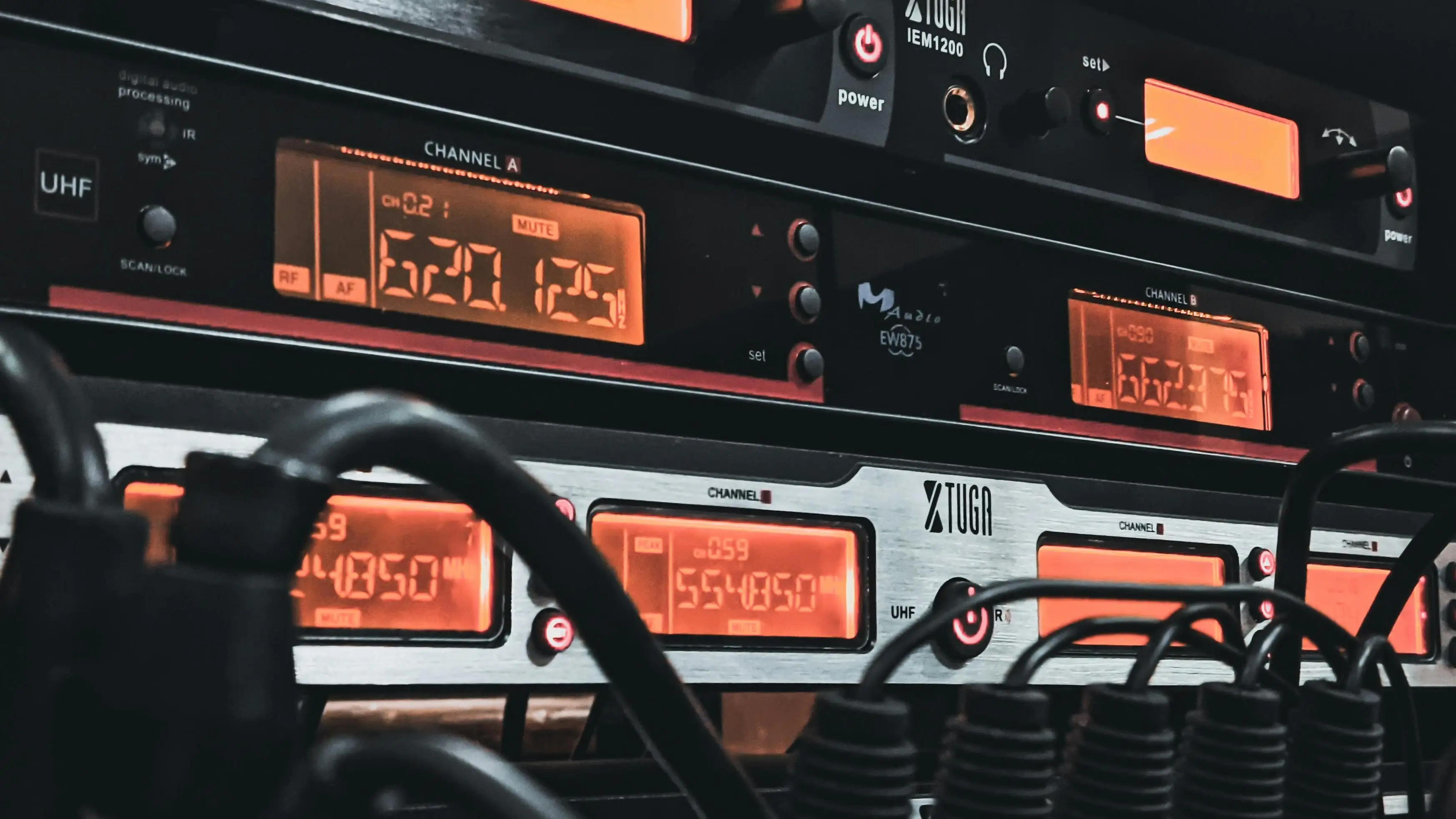What is a Sound Technician & How to Become One?
If you're looking for a career in audio, but you don't want to be center stage, it's worth considering the path of a sound technician. Sound engineering technicians are vital to live music, theatrical productions, and in some cases, larger studio environments that utilize complex systems and recording equipment.
A sound technician can also serve as a vital path on route to becoming a sound engineer, production sound mixer, or otherwise. We'll dive into some of the key components of this career path below so that you can determine whether this is a path for you to pursue.
What Exactly is a Sound Technician?
A sound technician is any audio professional that uses knowledge of acoustics, electrical and signal flow, as well as proper recording etiquette, to help produce live performances, conferences, or any other event that depends on having clean, reliable audio. There are many paths under the umbrella of sound technician as covered in this guide.
What Do Your Duties Look Like as a Sound Technician?
One of the reasons why starting a career as a sound technician is a great idea is the wide array of opportunities for advancement and evolution. There are so many ancillary duties and tasks you'll perform outside of just setting up and monitoring sound equipment as a technician, including but not limited to the following:
Live Troubleshooting and Maintenance
Sound technicians are responsible for maintaining and troubleshooting any gear used on set. You may find that you get asked about equipment outside of your immediate wheelhouse as well - whether that's conferencing software, streaming portals, capture cards, or otherwise.
In any case, sound technicians should be self-starters who are ready to tackle a problem at a moment's notice, even if the issue is unfamiliar.
File Management and Recording Media
Live performances are inherently precious. They only happen once, and so as a technician, or anyone on set really, it's incredibly important that audio files are backed up and stored properly for future use. Technicians should be organized and adhere to a similar process as the rest of the crew to prevent communication issues.
Equipment Set Up and Take Down
Sound techs are often the first to rise and the last to leave. You'll be responsible for setting up microphone stands, amplifiers, receivers, mixers, and any other gear that may help you carry out the day-to-day flow of your job.
Signal Flow and Gain Staging
It's critical that sound technicians have a firm understanding of signal flow, and some basic electrical knowledge to keep everyone safe on the job and protect audio equipment. One mismatched cable can easily damage a speaker or amplifier, so you need to have a firm understanding of signal processing before you start using gear on the job.
Cable and Other Equipment Organization
When you start out as an audio technician, you're probably going to become very familiar with the proper way to organize and wrangle cables. Audio techs help keep everything organized and in its right place on-site to keep crew and talent safe during a performance.
Consultation and Equipment Advisory
As you progress in your career, you might be asked to give input on preferred audio gear or help build out a capture setup. Audio techs are well-read on the latest and greatest equipment to stay in the know.
Live Mixing and Balancing
Live mixing will primarily be assigned to a specialized mixing engineer or audio engineer, but it's possible that a sound technician may be asked to step in to set basic levels or shadow the engineer.
It goes without saying that you need a good ear to be an effective technician and the willingness to step in on a moment's notice to prevent on-the-fly issues like interference or feedback.

Requirements to be a Sound Technician
Is your interest piqued by the prospect of working in live sound? Here are some general requirements to keep in mind if you want to work in the wide-ranging world of audio technology:
Living in an Audio Market with Consistent Work
Unfortunately, employment options for audio engineers and sound recording technicians can be somewhat limited if you're not in a high-traffic, metropolitan market.
Certification
For most audio production jobs, you'll be able to learn while doing, but in some cases, you'll be required to get certification before you can practice in certain workplaces.
For example, you might have to get an OSHA certificate to work jobs that involve cabling or other grunt, technical work. Other certifications include the CEA (Certified Audio Engineer) or CTS (Certified Technology Specialist), provided by organizations like the Audiovisual and Integrated Experience Association and the Society of Broadcast Engineers.
Dependability and Soft Skills
So much of working in live events and performance settings boils down to being dependable, on time, and being a fairly pleasant person to work with. Under most circumstances, the sound technician has to communicate across multiple teams and personalities, so having adequate soft skills is a must.
Additional Skillsets
Depending on which type of sound technician you become, you may be surprised to find that you'll be handling much more than sound itself.
Whether it's learning the basics behind troubleshooting electronics, signal flow, programming and triggering sound effects, or programming lighting, you're bound to use additional skills on the job.
A great sound technician is ready to learn and utilize resources outside of what neatly aligns with his or her job duties.
How Much Do Sound Technicians Earn?
The amount of money a sound technician earns varies greatly depending on location and level of experience. According to Glassdoor , sound technicians earn a median level of 60,000 dollars a year, with the range between 47-76K.
It's worth noting that being a sound technician can serve as a stepping stone to higher paid positions like becoming an audio engineer or transitioning to becoming an A/V engineer.
What Training is Required to be a Sound Technician?
As with most jobs within audio, there isn't necessarily a set path to becoming a sound technician. You can feasibly come in as an intern or an apprentice to an established sound tech and learn on the job. Others may prefer to attend a formal vocational program or opt for an associate's or bachelor's degree in audio engineering or related career paths.
Before a sound technician can conceivably get paid, he or she needs to learn how to operate sound equipment on the job, understand the basic technical knowledge behind audio equipment circuitry, and have some level of in-person experience.
Where that in-person experience comes from is not especially important. Plenty of professionals move into sound technology after working in recording studios, as a live sound engineer, or even as working as lighting technicians.
How long does it take to become a sound technician?
It's hard to say how long it takes to become a sound technician because there are two critical components to the job: understanding the ins and outs behind the audio equipment you're working with and having the technical skills needed to reproduce sound on the fly.
Sound technicians are frequently working in fast-paced, high-stakes environments where it's easy to seriously damage equipment without extensive knowledge of the technical aspects of production.
In short, it could take anywhere from 2-5 years to feel proficient as a sound technician, though this time-frame could be faster or slower depending on your individualized track. The fastest path to becoming a technician would be to likely get on the job experience from the get-go as a sound assistant or intern, and work your way up the ladder in an apprenticeship model.
However, this requires candidates tracking down experienced electronic engineering technologists who are willing to teach which may be challenging depending on your area.
What is the difference between a sound engineer and a sound technician?
Sound technicians deal with more of the "on-the-ground" aspects of producing live or recording sound. You can think of a sound engineer or audio engineer as the overall director of the audio technician or sound technician positions.
So while the audio engineer makes most of the critical decisions regarding the balance and mix of a stage, the sound technician carries out the physical set up and ensures that sound quality comes together by rigging equipment as needed.
Drawbacks to Being a Sound Technician: Factors to Consider
While working in music technology can have plenty of rewards, it's important to note that as with any career, there can be considerable drawbacks to this career path. Here are some of the main challenges you should be aware of if you pursue the role of sound technician:
- Irregular Work Hours: As with most careers in audio and music, the hours of a song technician are often long, unpredictable, and likely to fall on weekends and potentially holidays. This may make it more difficult to tend to the other aspects of your life. Work can also be fairly sporadic, especially if you're a freelancer. You'll need to consistently pitch yourself to make a full-time living as a freelance technician.
- Fast-Paced, High-Stakes Work: You can get as many certifications as you'd like as an audio technician, but ultimately, the proof is in the pudding. If you make a mistake live, most likely everyone will be aware of that mistake, which can conceivably put your job on the line. Live audio is a fast-paced, dynamic environment that requires active listening and a willingness to adapt on a moment's notice. If you're not able to stay alert for several hours at a time, this probably isn't a great fit for your disposition.
- Inconsistent Pay: Like other labor careers, you're only getting paid when you work, unless you're one of the few technicians that are hired as salaried workers within a larger company. This can make your paychecks come at irregular intervals, so you'll need to be very proactive in terms of saving your money and potentially picking up other gigs in between audio technology jobs to pay your bills.
- Physically Demanding: Sound technicians need both problem solving skills and a capacity for physical labor. Especially in the early days, you will likely be responsible for setting up and tearing down hefty audio equipment, wrangling cables, and a number of other grunt work tasks which can take a toll on your physical health if not monitored carefully.
- Behind-the-Scenes Support: Audio engineers and technicians, though critical to the performance of sound systems and recognizable artists, are often unseen. This isn't a job where you'll receive a lot of public kudos, but know that getting clean, crisp audio recordings, especially in a live setting, is no easy feat.
Becoming a Sound Technician is an Excellent Path for the Right Candidate
Not everyone is cut out to become a sound technician, and that's okay. But for those audio specialists who can adapt to this career path's unique challenges, there are plenty of ways to reap the benefits. Hopefully, this guide provides a more clear picture of what being an audio technician is like so that you can decide whether or not this is a worthy contender for your career.





